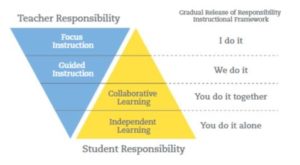Outstanding Results for Barbreck

Parents place great faith in trusting St Catherine’s teachers to support and nurture their daughters. This is a trust we take very seriously. So, how is Barbreck travelling? Are we doing the best for our students? Are our teachers using highly effective classroom practices consistently? We thought it important to find out the answers to these questions.
St Catherine’s Barbreck Teaching and Learning Framework adopts a Gradual Release of Responsibility teaching model. This is characterised by a teaching methodology of ‘I Do, We Do, You Do’ which includes explicit instruction and describes the approach teachers adopt in their classrooms.
This type of teaching is supported by extensive research evidence which shows this methodology to be highly effective. To assess the model’s effectiveness within Barbreck a review was undertaken to determine the level of success our Barbreck teachers have had implementing this teaching initiative.
Prior to my employment at St Catherine’s, I was the Project Director for School Improvement at the Australian Council for Educational Research (ACER). My role there was to conduct reviews of schools across Australia and internationally. Reviews were conducted using the School Improvement Tool (SIT) which identifies practices of highly effective schools, including schools that have undergone substantial improvement.
The SIT is based on extensive research evidence and conversations with school leaders and teachers across Australia. The SIT does not describe everything that effective schools do but focuses on those practices that are most directly related to school-wide improvements, and thus outcomes for students. A key feature of the SIT is the set of performance levels – Low, Medium, High, and Outstanding. In my time at ACER, very few schools met the outstanding criteria.
The review process for Barbreck was undertaken using the SIT. In conducting the review, I interviewed every Barbreck teacher, examined teaching plans and assessments, observed teaching and noted what students were doing in class.
The review found that all teachers at Barbreck are consistently utilising the ‘I Do, We Do, You Do’ teaching method. All teachers were consistent in their conversations and displays of other evidence, which demonstrates a level of embedded behaviour across the campus.
Utilising the SIT performance levels, our review revealed that Barbreck is performing at an Outstanding level. In particular, it was observed that at Barbreck:
- School leaders and staff demonstrate a strong conviction that improved pedagogical practice is the key to improved student learning.
- School leaders and teachers are committed to identifying, understanding, and implementing effective teaching practices.
- Teaching strategies that have been demonstrated through research and practice to be highly effective are prioritised.
- There is an explicit expectation that all students are actively engaged, and appropriately challenged.
- Deep learning is enabled through a shared understanding of learning intentions and what quality looks like, progressively building students’ conceptual understanding.
The behaviours listed above are what highly successful schools demonstrate. Our Barbreck teachers are consistently demonstrating these behaviours.
Our exemplary NAPLAN data shows our students are achieving at a standard well above state and national levels. This is no surprise when the behaviours described by ACER’s School Improvement Tool are demonstrated consistently every day in every class in our Junior School.
Apart from observing the above behaviours, what excited me most during the review process was my observation of Barbreck teachers who love the students they teach and enjoy what they do. Barbreck teachers support each other, are collaborative and endeavour to make their classrooms the best they can be,
So, the answers to the questions posed at the beginning of this article: How is Barbreck travelling? Are we doing the best for our students? Are our teachers using highly effective classroom practices consistently? The research says yes, absolutely!



